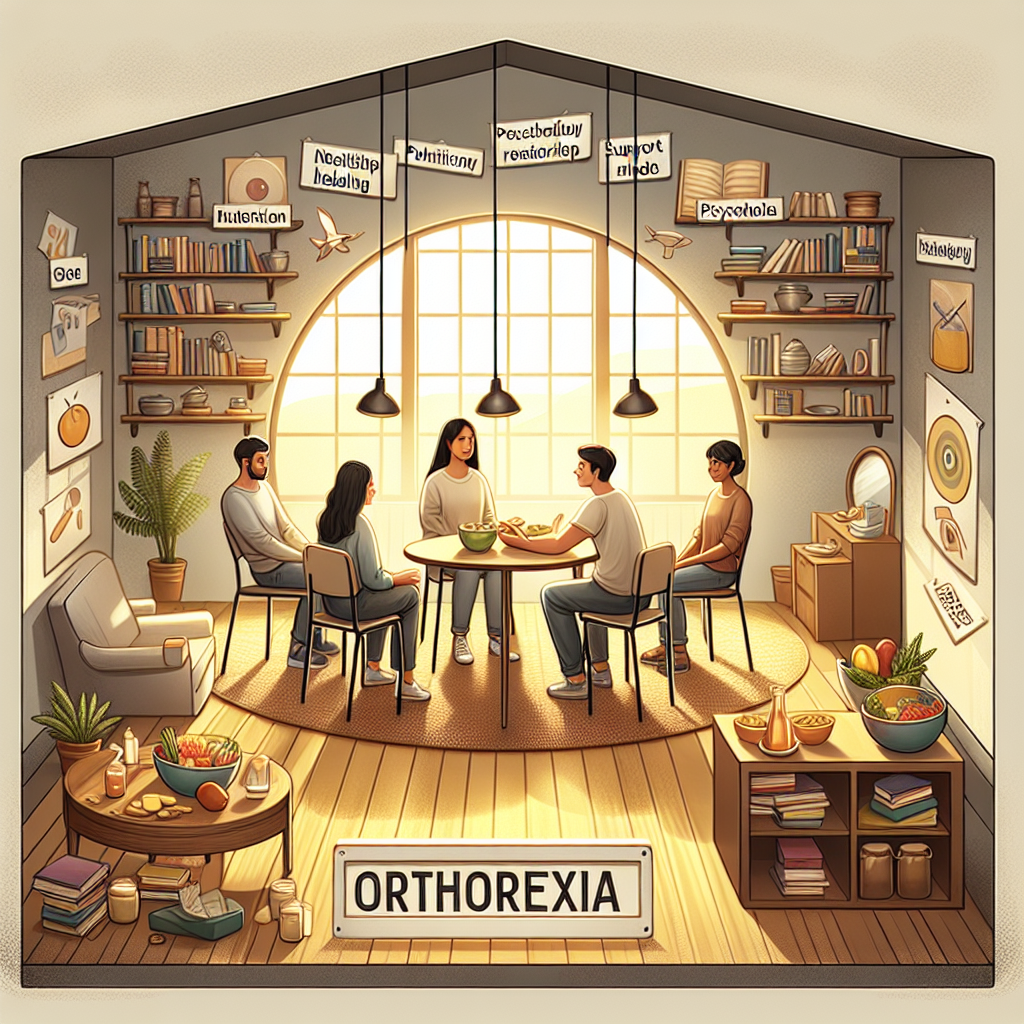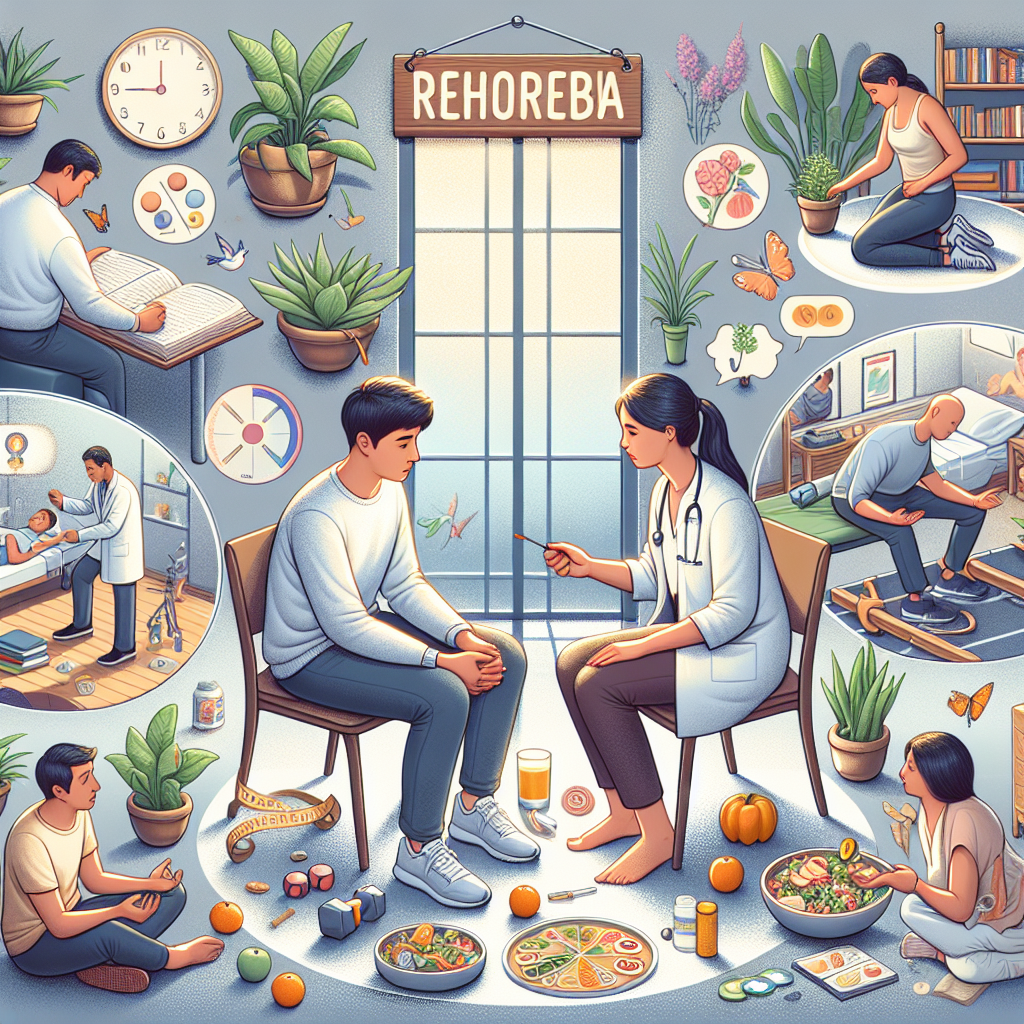-
Table of Contents

“Rehab for Orthorexia: Rediscover Balance, Embrace Wellness.”
Introduction
Rehabilitation for orthorexia, a condition characterized by an obsessive focus on healthy eating, involves a comprehensive and multidisciplinary approach aimed at restoring a balanced relationship with food and improving overall mental and physical health. During rehab, you can expect a combination of medical supervision, nutritional counseling, and psychological therapy. Medical professionals will monitor your physical health to address any nutritional deficiencies or related health issues. Nutritional counseling will help you develop a more flexible and balanced approach to eating, while psychological therapy, often including cognitive-behavioral therapy (CBT), will address the underlying emotional and cognitive patterns contributing to orthorexia. Group therapy sessions may also be part of the program, providing support and shared experiences with others facing similar challenges. The goal of rehab is to help you achieve a healthier, more balanced lifestyle and to equip you with the tools needed to maintain this balance long-term.
Understanding The Initial Assessment Process In Orthorexia Rehab
When embarking on the journey of rehabilitation for orthorexia, understanding the initial assessment process can be both enlightening and reassuring. This crucial first step sets the foundation for a personalized and effective treatment plan, tailored to address the unique needs of each individual. The initial assessment is designed to provide a comprehensive understanding of the individual’s physical, psychological, and emotional state, ensuring that the subsequent treatment is holistic and well-rounded.
Upon entering a rehabilitation facility, the first interaction typically involves a detailed intake interview. During this interview, healthcare professionals will gather extensive information about the individual’s eating habits, dietary restrictions, and the extent of their preoccupation with healthy eating. This conversation is not just about collecting data; it is an opportunity for the individual to share their story, express their concerns, and begin to build a trusting relationship with their care team. The intake interview often includes questions about the individual’s medical history, any previous treatments or interventions, and their current mental health status. This comprehensive approach ensures that the care team has a full picture of the individual’s health and can identify any co-occurring conditions that may need to be addressed.
Following the intake interview, a series of physical assessments are conducted to evaluate the individual’s overall health. These assessments may include blood tests, body mass index (BMI) measurements, and other diagnostic tests to identify any nutritional deficiencies or physical complications resulting from orthorexia. The results of these tests provide valuable insights into the individual’s physical well-being and help to inform the development of a tailored nutritional plan. It is important to remember that these assessments are not meant to be invasive or judgmental; rather, they are essential tools in creating a comprehensive treatment strategy that promotes healing and recovery.
In addition to physical assessments, psychological evaluations play a critical role in the initial assessment process. Mental health professionals will conduct thorough evaluations to understand the underlying psychological factors contributing to orthorexia. These evaluations may involve standardized questionnaires, interviews, and other assessment tools designed to gauge the individual’s mental health, emotional well-being, and any potential co-occurring disorders such as anxiety or depression. By identifying these underlying issues, the care team can develop a treatment plan that addresses both the physical and psychological aspects of orthorexia, ensuring a more holistic approach to recovery.
Throughout the initial assessment process, it is essential for individuals to feel supported and understood. Rehabilitation facilities often emphasize the importance of creating a safe and non-judgmental environment where individuals can openly discuss their struggles and fears. This supportive atmosphere fosters a sense of trust and encourages individuals to actively participate in their treatment journey. It is also important for individuals to recognize that the initial assessment is just the beginning of their recovery process. While it may feel overwhelming at times, each step taken during this phase is a step towards healing and reclaiming a balanced and healthy relationship with food.
In conclusion, the initial assessment process in orthorexia rehab is a vital component of the recovery journey. It provides a comprehensive understanding of the individual’s physical and psychological state, allowing for the development of a personalized and effective treatment plan. By approaching this process with openness and trust, individuals can lay the groundwork for a successful and transformative rehabilitation experience. Embracing the initial assessment as a positive and necessary step can inspire hope and confidence, setting the stage for a journey towards health, balance, and well-being.
Daily Therapy And Support Structures In Orthorexia Rehabilitation Programs
Embarking on the journey of rehabilitation for orthorexia can be both daunting and transformative. Understanding what to expect during this process can help ease anxieties and set the stage for a successful recovery. Daily therapy and support structures play a crucial role in orthorexia rehabilitation programs, providing a foundation for healing and growth.
Upon entering a rehabilitation program, individuals are often greeted with a comprehensive assessment. This initial evaluation helps to tailor a personalized treatment plan that addresses the unique needs of each person. From the outset, the focus is on creating a supportive and nurturing environment where individuals feel safe to explore their relationship with food and health.
Daily therapy sessions form the cornerstone of orthorexia rehabilitation. These sessions typically include a mix of individual and group therapy. Individual therapy offers a private space to delve into personal experiences, uncover underlying issues, and develop coping strategies. Therapists use evidence-based approaches such as cognitive-behavioral therapy (CBT) to challenge and reframe unhealthy thought patterns related to food and body image.
Group therapy, on the other hand, provides a sense of community and shared understanding. In these sessions, individuals can connect with others who are facing similar challenges, fostering a sense of camaraderie and mutual support. Sharing experiences and hearing others’ stories can be incredibly validating and empowering, helping to break the isolation that often accompanies orthorexia.
In addition to traditional therapy, many rehabilitation programs incorporate holistic practices to support overall well-being. Mindfulness and meditation sessions are commonly included to help individuals develop a more balanced and present-focused mindset. These practices can be particularly beneficial in reducing anxiety and promoting a healthier relationship with food.
Nutritional counseling is another vital component of orthorexia rehabilitation. Registered dietitians work closely with individuals to create balanced meal plans that meet their nutritional needs while also addressing any fears or misconceptions about certain foods. Through education and gradual exposure, individuals learn to reintroduce a variety of foods into their diet, fostering a more flexible and intuitive approach to eating.
Support structures extend beyond therapy and counseling sessions. Many programs offer a range of activities designed to promote physical, emotional, and social well-being. These might include art therapy, yoga, recreational outings, and educational workshops. Engaging in these activities helps individuals rediscover joy and fulfillment outside of their preoccupation with food and health.
Family involvement is also a key aspect of many rehabilitation programs. Family therapy sessions can help to address any relational dynamics that may have contributed to the development of orthorexia. Educating family members about the condition and involving them in the recovery process can create a more supportive home environment, which is crucial for long-term success.
Throughout the rehabilitation process, individuals are encouraged to set realistic and achievable goals. Celebrating small victories and progress, no matter how incremental, helps to build confidence and motivation. The journey to recovery is often non-linear, with ups and downs along the way. However, with consistent support and a compassionate approach, individuals can gradually move towards a healthier and more balanced life.
In conclusion, daily therapy and support structures in orthorexia rehabilitation programs are designed to provide a comprehensive and nurturing environment for recovery. Through a combination of individual and group therapy, holistic practices, nutritional counseling, and supportive activities, individuals can develop the tools and resilience needed to overcome orthorexia. With dedication and the right support, the path to healing is not only possible but also profoundly rewarding.
Q&A
1. **Question:** What types of therapy are commonly used in rehab for orthorexia?
**Answer:** Cognitive Behavioral Therapy (CBT), Dialectical Behavior Therapy (DBT), and nutritional counseling are commonly used in rehab for orthorexia.
2. **Question:** How long does a typical rehab program for orthorexia last?
**Answer:** A typical rehab program for orthorexia can last anywhere from a few weeks to several months, depending on the severity of the condition and individual progress.
Conclusion
During rehab for orthorexia, you should expect a comprehensive treatment plan that includes medical supervision, nutritional counseling, and psychological therapy. The focus will be on normalizing eating patterns, addressing underlying psychological issues, and developing a healthier relationship with food. You may participate in individual and group therapy sessions, and work closely with dietitians to create balanced meal plans. The goal is to achieve both physical and mental recovery, fostering long-term healthy eating habits and improved overall well-being.



